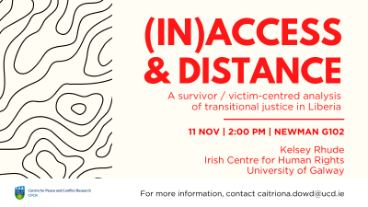(In)Access&Distance: A survivor/victim-centred analysis of transitional justice
CPCR Current Events
- Public Lecture: The burden of memory’ – collective identity, narrative and re-writing the past in Northern Ireland by Professor Jim McAuley
- Book Launch: Political Change Across Britain and Ireland
- CPCR Seminar by Dr Fatima el Issawi
- New Foundations Research Project
- CPCR hosts: Transitional Justice event
- (In)Access&Distance: A survivor/victim-centred analysis of transitional justice
- CPCR Film Screening: Wave Goodbye to Dinosaurs
- CPCR & CHA host: Covert warfare and the performance of humanitarian neutrality in Cold War Central America
- CPCR hosts: Two Nonviolent Actions A Day Keep the Dictator Away?
- CPCR & DFA host event: Mapping Peace and Conflict Research in Ireland
- CPCR hosts: The Women’s Activities in Armed Rebellion Project
- CPCR Annual Conference 2024
- CPCR Seminar: Invisible Men: The Injured Lives of Afghan Interpreters
- Talk4Peace/CPCR Seminar: Mechanisms for Inclusive Dialogue in Peacebuilding
- CPCR Seminar: I have to speak - Colombia and Uganda, Dr Evelyn Pauls
- CPCR publishes on "Mapping Diversity, Negotiating Differences"
UCD's Centre for Peace and Conflict Research invite you to join a seminar on:
(In)Access and Distance: A survivor / victim-centred analysis of transitional justice in Liberia
Kelsey Rhude
Irish Centre for Human Rights, University of Galway
2pm-3pm, Monday 11 November
G102 Newman Building
Evaluating the Liberian National Palava Hut Programme for Peace, Justice, and Reconciliation: From its Historical Roots to National Implementation
Focusing on the case study of Liberia, a, this study examines the dynamics of (in)access to transitional justice using a survivor/victim-centred analysis. This research is one of the first comprehensive qualitative assessments of transitional justice in Liberia in the aftermath of the Truth and Reconciliation Commission’s mandate. The study is based on extensive qualitative data collected through fieldwork in Liberia, including interviews, focus group discussions, direct observation, and empirical research on transitional justice and peacebuilding processes. The presentation will focus primarily on analysis tracking the implementation of the National Palava Hut Programme (NPHP), a traditional mechanism for alternative dispute resolution adapted to address the objectives of post-conflict peace, justice, and reconciliation on a national level in Liberia. Through thematic analysis, the study demonstrates that NPHP is producing two crucial transformations within communities who participated in the programme, including 1) transformation of desires for retaliation, and 2) transformation of relationships between former combatants, survivors/victims, and the wider community. As a result, the NPHP is contributing to building social cohesion and sustainable peace in communities targeted for implementation. The research thus illustrates the duality of post-conflict peace and justice embedded in the programme’s practice.
Kelsey Rhude recently completed her doctoral thesis at the Irish Centre for Human Rights in the University of Galway and is currently a research associate at UCD for the Role of Social Capital in Urban Fragile Contexts (SoCap) project led by Dr Caitriona Dowd. Kelsey's research evaluates ‘local’ and survivor-centred approaches to transitional justice in Liberia's post-conflict landscape, with particular focus on the Palava Hut mechanism, the Liberian TRC, and reparations. Having worked in both academic and NGO spaces, Kelsey is an early career researcher with expertise in socio-legal and qualitative research in the fields of transitional justice, peacebuilding, and international human rights law.
